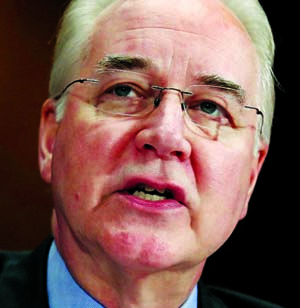
AFP :
Traffic through the exit door of Donald Trump’s administration has been astonishingly high since he became president on January 20.
On Friday, Secretary of Health and Human Services Thomas Price became the latest casualty of eight months of bedlam in the executive offices of the world’s most powerful country.
Here are the main Trump aides who have come and gone since January, before Americans ever really got to know them: National Security Advisor Mike Flynn –
Trump steadfastly defended his national security adviser, even though Flynn had been fired by Barack Obama from his job as defense intelligence chief and was deeply distrusted across the intelligence community.
Flynn lasted only 22 days, forced out on February 13 over top-level concerns that he could be compromised by false statements he made over his contacts with Russian officials and his paid lobbying for Turkey during the campaign.
Press Secretary Sean Spicer –
Spicer’s troubles began immediately when he was called to defend his boss’s false claim about the size of the crowd at his inauguration. Spicer described the turnout as “the largest audience to ever witness an inauguration, period.” But aerial photos clearly showed the crowd was much smaller than when Obama was sworn in for his first term in 2009. Spicer instantly lost credibility with the media.
He quickly became the favorite administration target of the comedy show Saturday Night Live, played as an oafish and irritable Trump fall-guy by comedian Melissa McCarthy.
Seeming to know his days were numbered, Spicer took to fending off questions about his boss’s most provocative statements by telling the media that “the tweet speaks for itself. I’m moving on.” Out on July 22, he lasted 182 days. He left when Anthony Scaramucci was named White House communications director.
Chief of Staff Reince Priebus –
The faceless former chairman of the Republican National Committee was supposed to manage the White House and control the door to Trump’s office. But he couldn’t manage the president himself and thus failed at any attempt to quell the chaos swirling in the West Wing. A close ally of Spicer, Priebus took a hard fall when Trump named Scaramucci as the new communications director. Scaramucci publicly described Priebus as a “paranoid schizophrenic” and when Trump let that statement stand, rather than defend Priebus, he took the exit door after 189 days, on July 31.
Scaramucci, ‘the Mooch’ –
Scaramucci’s no-holds-barred play for Priebus’s job after he was hired on July 21 was a display of his brash New York tough-guy approach to office politics. It sat poorly with the man Trump ultimately chose to be chief of staff, then Homeland Security Secretary John Kelly. Within days “the Mooch”-already a late night TV icon for his tailored suits, aviator sunglasses and slicked back hair-had all the attention on himself, which was a no-no for Trump. He ended up with the shortest tenure of anyone in the Trump White House: a paltry 10 days.
Chief Strategist Steve Bannon –
The architect of Trump’s nationalist-populist political stances and his election victory, Bannon was called the Prince of Darkness, Darth Vader, and even the Shadow President. His economic nationalism became the lynchpin of Trump policies, even as many of his other ideas were rebuffed by policy rivals. But after Kelly arrived, his constant clashes with other Trump advisors became untenable, as did his ties to the extreme right, which drew accusations that Trump represented racists. Bannon lasted 210 days.
Health Secretary Tom Price –
A former doctor and congressman, Price spearheaded Trump’s efforts to “repeal and replace” Obama-era healthcare reforms that offered millions more Americans access to treatment, but which Republicans argue are unsustainable.
Before that dream could be realized, Price was forced to resign when it emerged that he had flown 26 trips this year on chartered private aircraft, costing the US taxpayer around $400,000.
Other casualties of the first eight months: Derek Harvey, Middle East advisor on the National Security Council; early Communications Director Mike Dubke; KT McFarland, deputy national security advisor; Katie Walsh, White House deputy chief of staff; Craig Dear, National Security Council Western Hemisphere Affairs director; and Angela Reid, White House chief usher.

